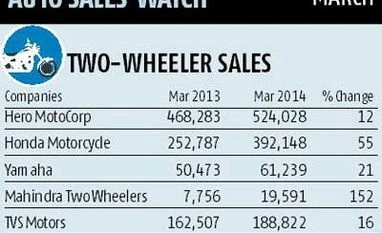This is the first time in more than a decade that sales have declined. High interest rates, rising fuel prices and uncertain economic conditions hit sales of companies such as Maruti Suzuki India, Hyundai Motor India, Mahindra & Mahindra (M&M) and Toyota Kirloskar. The country’s largest car maker, Maruti Suzuki, reported a drop of 5.2 per cent in sales at 102,269 units last month. Though, sales for the entire financial year at 1,053,689 units fared comparatively better closing at almost the same levels as last year. Sales of entry-level models such as the Alto, A-Star and WagonR slipped 11 per cent to 40,085 units in March, while demand in the premium segment rose 9.3 per cent to 28,285 units, driven by new entrant Celerio.
Kumar Kandaswami, senior director, Deloitte Touche Tohmatsu India, said, “Two factors impacted the passenger car sales last year. One, the growth of the per capita disposable income over growth of inflation was negligible or negative. This was the most important factor that drove down sales. Two, due to the high inflation, there was a drop in domestic saving rate — consumers were under stress to maintain their lifestyles. This situation does not support purchase of cars, in general. Clearly, at the entry level, the segment that was most impacted by inflation chose to stay away from buying new cars.”
Korea’s Hyundai saw volumes improve three per cent to 35,003 units last month. However, for financial year 2014, sales dropped 0.9 per cent to 380,253 units. Rakesh Srivastava, senior vice-president (sales and marketing), Hyundai, said, “After the reduction of excise duty and with the strong performance in compact segment, Hyundai registered March sales of 35,003 units with a growth of 3.4 per cent over corresponding month, indicating a build-up of positive momentum.”
Others in the industry remain sceptical. “Cautious is how we should define the first quarter of 2014. The excise duty reduction has definitely been a positive step. As India gets set to vote, we look forward to such industry-friendly initiatives being sustained to support the important automotive sector,” said Vinay Piparsania, executive director of marketing, sales and service at Ford India.
Pravin Shah, chief executive (automotive division), M&M, said, “After the reduction in the excise duty across all segments, the auto industry has seen the level of enquires going up, but has not witnessed any major surge in sales. We do hope that the sentiment improves and change after the national elections, leading to an increase in demand as well.”
Tata Motors monthly volumes improved marginally 2.4 per cent to 12,640 units in March but overall sales for FY14 dipped 38 per cent to 138,455 units. At Toyota, sales declined by about 58 per cent to 8,206 units, though the decline was partially due to disruption in production at the company’s two facilities in Bidadi, Bangalore.
Honda cars bucked industry trend to post record growth of 83 per cent in sales both in March (18,426 units) and for the entire financial year (134,339 units). Nearly 92 per cent of volumes in March came from the newly launched City and entry-level sedan Amaze, both of which are available in diesel.
DUTY BOOSTER
An excise duty cut on scooters and motorcycles to 8% from 12% and new launches boost two-wheeler sales in the month
* Honda recorded sales of 3.72 million units in financial year 2014, with 55,000 units sold on March 31 on the occasion of Gudi Padwa and Ugadi in west and south India, respectively
* Honda’s domestic market share zoomed to record high of 28% in March
* Mahindra is riding high on demand for its Centuro motorcycle
)